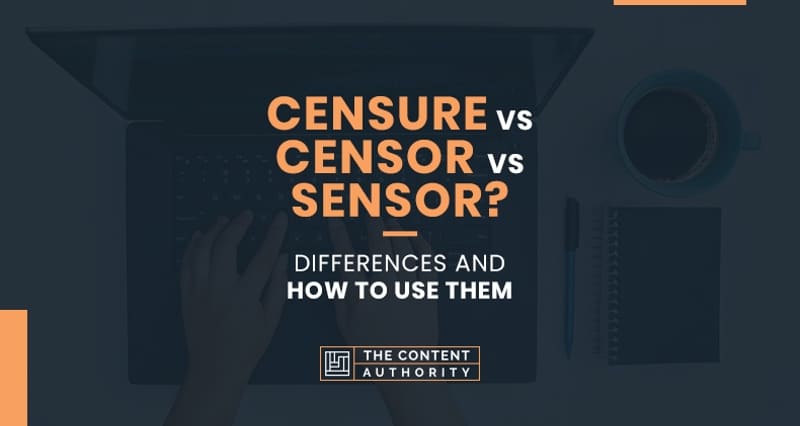Terms that sound identical and also have similar meanings can be difficult to manage. The words “censor” and “censure” are examples of such terms. But when you throw in one more term into the mix, things get even more confusing.
“Censure” means “to reprimand”. “Censor” is removing “offensive”, “obscene” aspects from a piece of work meant for public consumption. And “sensor” denotes any piece of tech built into cameras, detectors, etc. “Censure” and “censor” work as both nouns and verbs in texts. “Sensor” is primarily a noun.
If you’d like to learn more about the differences between the three words, how to use them in various writing contexts, and more, continue reading.

“Censure” – Definition
The term “censure” means to “officially denounce” or “speak against someone”. It’s basically “official displeasure” or “formal rebuke”. An individual can be “censured” for their actions or even their words. The term “censure”, and also “censor”, come from “censere”, a Latin term that means “judge” or “appraise”.
The synonyms or related words for “censure” include:
- criticize
- reprehend
- reprobate
- denounce
- condemn
Unlike the above words, however, “censure” implies “authority” and “reprimanding”. It invariably denotes “official action”.
“Censor” – Definition
“Censoring” or “to censor” a piece of writing or speech is “suppressing inappropriate work” so that it doesn’t become available to the public in its “raw” form. Bleeping “expletives” or “obscenities” on national television is a form of censoring broadcasters resort to. Not to mention, the noun “censorship” is based on “censor”.
According to The Free Dictionary by Farlex, the term “censor” originally served as a noun, referring to “magistrates overseeing and upholding moral standards”. Over a period, the word evolved to mean an individual or entity with authority to examine different forms of media, such as movies, books, plays, etc., and clean up or quash obscene, vulgar, or any other form of objectionable content.
A “censor” is typically a body or entity instituted and/or governed by the state. The body consists of individuals who have the government’s permission to read publications, watch movies or theatrical performances, etc., before they are made public.

As they are set in place by the ruling government, they usually tend to adhere to the state’s requirements or expectations. If a movie or book consists of something that’s not deemed “acceptable” by the state, the piece of work is likely to be censored heavily or not allowed to be released at all.
“Sensor” – Definition
A “sensor” is any device that measures or detects a physical property and indicates, documents, or responds to the thing. Digital cameras have sensors built in them, for instance, which help snap images and record videos. Metal detectors also have sensors. Not to mention, the noun “sensor” comes from “sense”. The term is derived from the Latin word “sentire”, which means “to feel”.
Most modern-day sensors are “digital”, producing data for subsequent computer processing. Analog sensors, however, exist too. The sensors used in smoke detectors, for instance, are analog. The sensor found in the detector is radioactive material positioned between a couple of electrically charged plates.
The arrangement helps ionize the air, causing current flow between the two plates. When smoke penetrates the chamber, the light gets reflected onto the sensor, causing the alarm to trigger. The motion detectors used to automatically open public building doors also employ analog sensors.
Using “Censure”, “Censor”, and “Sensor” in Texts
The words “censure” and “censor” can be used as a verb or a noun in writings. “Sensor” is typically used as a noun in sentences.
When used as a verb, “censor” means to examine a particular thing and remove portions of it perceived to be “inappropriate”, “offensive”, etc.
- Tim’s job was censoring cuss words on television shows.
The following sentence employs “censor” as a noun:
- The beach censors were found arresting scantily clad women.
Like “censor”, “censure” can also be employed as a noun or a verb. When employed as a verb, “censure” means “to criticize or speak out against something”. The word is invariably used formally and not so much in casual conversations.
- The judge censured him for his careless behavior.
When incorporated as a noun, the word denotes “official criticism”. A “censure” is usually a component of punishment.
- He received censure from his manager for checking out Instagram at work.
- If she gets another censure, she will lose her job.
The term “sensor” is almost always used as a noun. Example sentences mentioned below illustrate the point.

Similarities and the Ensuing Confusion Between “Censure”, “Censor”, and “Sensor”
The three words “censure”, “censor”, and “sensor” sound almost identical when pronounced, and they have relatively similar spellings too. This tends to cause confusion when using the words in sentences, particularly when trying to choose between “censor” and “sensor”.
Errors entailing “censure” or incorrectly using the word in place of “censor” or “sensor” are comparatively rare. This is because “censure” has a slight yet distinct difference in pronunciation compared to “censor” and “sensor”.
The words “censor” and “sensor” are pronounced as “SEN-ser”. “Censure”, on the other hand, is pronounced as “SEN-shire”, which rhymes with “sure”.
About their meanings, “censor” and “censure” are similar to each other. A “censor” basically cuts or hides information considered “offensive”, “harsh”, or “obscene”. A “censure”, on the flip side, deals with “harsh criticism”. Both entail assessing, judging, and/or reflecting on other’s work.
When a piece of work is not “censored” properly or is out for the general public to consume, the “censor” is likely to be “censured”.
Kindly note, “censer” and “censor” are not the same, or they do not belong to different dialects of English. “Censer” is a valid word and not a misspelling of “censor”. It denotes “incense burners” used in a church.
Distinguishing Between “Censure”, “Censor”, and “Sensor”
The key to differentiating the three terms from each other is focusing on their roots and meanings. As mentioned above, “sensor” is derived from “sense”. If the word to be used has to do with “sensing”, “sensor” is likely the word. If not, use “censor”.
Think of the term “census” for “censure” and “censor”. All of the three begin with “c”. If you’re having trouble drawing the line between “censure” and “censor”, focus on the suffixes. In other words, the “-or” in the word “censor” denotes an individual or entity that resorts to certain actions. Most importantly, only “censor” can be used to denote a person.
The “-ure” in the term “censure”, on the other hand, denotes the outcome of an act that aligns with the meaning of that word, which is “a kind of punishment”.
Example Sentences with the Word “Censure”
Here is a list of sentences that use “censure” to good effect:
- If you want to become famous and loved, you should be ready for censure too.
- The fear of censure is a sign you will not make it big.
- The commandant had written them three letters of censure.
- To avoid being censured by others, self-correcting whenever possible is imperative.
- Following the review, the commission concluded no censure was needed.
- After the censuring, the professor was seriously contemplating early retirement.
- He was not censured or punished for his alleged role in the scandal.
- The board censured the manager but did not dismiss him.
Example Sentences with the Word “Censor”
The following are sentences with the word “censor” and the different inflections of the term. As mentioned above, “censorship’ has its roots in “censor”, and, therefore, a sentence or two incorporating the word could be included below.
- Unlike nudity, violence in films is not as heavily criticized or censored.
- She speaks her mind without any filter or censor.
- The censor deleted multiple paragraphs from the book.
- Unlike movies, museums do not have official censorships.
- History is proof that efforts to censor communication at a macro level never succeed.
- The film was never released outside its home country, thanks to the state’s censor board.
- The book was censored heavily during its initial release, only to be republished in its original avatar a year later.
- It was only later found out that the upper management heavily censored the employee’s reports.
- The director was not in favor of a small group of random people censoring his movie.
- The government has censored all files containing information on aliens.
- Despite many countries’ attempts to censor the work, it still turned out to be a roaring success worldwide.
Example Sentences with the Word “Sensor”
The following are sentences incorporating the word “sensor”:
- To prevent crime, better and more surveillance cameras and sensors must be instituted.
- The infrared sensor was devised to detect movement.
- The clothing company makes shirts with built-in sensors.
- Almost all smartphones come with sensors, which determine how bright the screens should get in relation to their environment or how they are used.
- Electromagnetic radiation caused disruptions in the spacecraft’s sensor.
- The security system has a network of motion and heat sensors that help detect intruders.
- Modern airplanes are automated in large part, courtesy of the many advanced sensors built in them.
Conclusion
“Censor” and “sensor” are homonyms, and they are likely to create confusion among many writers. The term “censure”, on the other hand, has a slightly different sound and unique spelling too, which reduces the chances of getting the word mixed up with “sensor” or “censor”.
But there is still room for confusion with “censure”, and it’s, therefore, imperative to address the same. You don’t want to “censor” somebody when the objective was to “censure” them.
Shawn Manaher is the founder and CEO of The Content Authority. He’s one part content manager, one part writing ninja organizer, and two parts leader of top content creators. You don’t even want to know what he calls pancakes.


